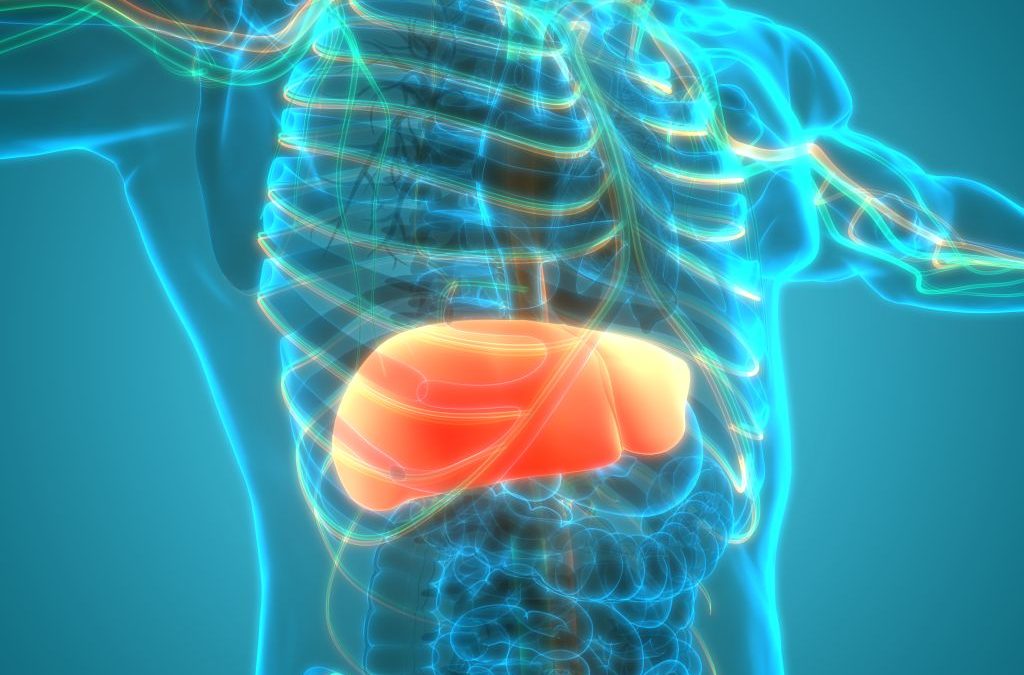October is Liver Awareness Month so it’s a good time to take a look at the liver and its important functions.
The liver weighs about 3 pounds and is about the size of a football. It is both an organ and a gland. The liver has 500 functions, mainly digestion and detoxification.
Digestion
The liver carries out the manufacture (synthesis) of essential proteins including albumin (to help maintain the volume of blood) and blood clotting factors. The liver synthesizes, stores, and processes (metabolizes) fats including fatty acids (used for energy) and cholesterol. The liver metabolizes and stores carbohydrates which are used as a source of glucose that the red blood cells and the brain use.
Detoxification
The liver is the major organ for detoxification.
The liver is the body’s filtration system. It filters out microbes, drugs and dead cells from the body as an immune function. Every hormone, chemical, bacteria, virus, fungus and parasite is filtered through the liver. The liver is like an oil filter in your car.
The liver eliminates, by metabolizing and/or secreting, the potentially harmful biochemical products produced by the body, biochemical waste products such as bilirubin from the breakdown of old red blood cells, and ammonia from the breakdown of proteins. It detoxifies, by metabolizing and/or secreting, drugs, alcohol, and environmental toxins from the body.
A special organ
The liver has many special features. For example, in order to carry out its functions, it has ducts (tubes) that closely connect it to the gallbladder and intestines. Thus, bile made by the liver travels through these tubes to the gallbladder. The bile is stored in the gallbladder between meals, and then is discharged into the intestines at mealtime to aid in digestion.
The liver is appropriately situated in the body to directly receive the blood that comes from the intestines. With this arrangement, the liver can readily process (metabolize) nutrients absorbed from food as well as other contents of this blood.
Because of its numerous biochemical functions, the liver is considered the biochemical factory of the body.
Gall bladder and bile
The liver makes bile, a digestive fluid. Bile acids, which include bile salts, aid in fat absorption and modulate cholesterol levels. They are produced from cholesterol in the liver and are stored in the gall bladder. The liver then secretes bile to aid in the intestinal absorption of fats and the absorption of fat-soluble vitamins.
Bile breaks down the fats in your diet. It also is necessary for the absorption of the fat-soluble vitamins. A, D, E, K. Without the proper bile salts, a person won’t get the benefits of these vitamins whether from supplements or from food.
If your body cannot absorb Vitamin A, you can have trouble seeing at night. You may have sinus problems and dry skin. Lack of absorption of Vitamin D can result in calcium not being absorbed, and this may cause seasonal depression. If your body cannot absorb Vitamin E, your libido may be low. Not absorbing Vitamin K can result in bruising.
Lack of bile can result in bloating, burping, belching and particularly feeling very bloated at night.
Symptoms of liver problems
If the liver becomes damaged over the years, toxins that are normally filtered out can re-circulate through the body exposing delicate glands to harmful compounds and can trigger a toxic overload. Synthetic estrogens, medications, aspirin, birth control pills can cause damage. Excessive alcohol will damage and eventually destroy the liver.
Damage to the liver can cause a potbelly appearance. Fluid coming from the destruction of the liver will leak into the sac around belly and create a hard, solid feeling stomach.
Symptoms that your liver may be being overtaxed are: right shoulder pain, red spots on the skin, itchy skin, Psoriasis, liver spots, hot feet, itchy bottoms of the feet, white tongue, bad breath, and indigestion and bloating.
Liver regeneration
The good news is that the liver can regenerate, but it takes some dedication. Three years of eating a certain way to support the liver can act to regenerate it.
High protein diets are not recommended for someone with a less than stellar liver. This is especially true for someone who is older who may have more problems digesting protein. Fats from high-protein foods will be released through the liver and can cause congestion.
Your liver needs vegetables. Vegetables have vitamins and minerals to burn more fat. Eating lots of vegetables provides excellent nutrition and improves liver function. Cruciferous vegetables, such as broccoli, cauliflower, cabbage, kale, bok choy, arugula, Brussels sprouts, collards, watercress, and radishes are particularly helpful to the liver.
Alcohol is very hard on the liver and can result in alcoholic fatty liver disease (AFLD). Drinking a large amount of alcohol, even for just a few days, can lead to a build-up of fats in the liver and this is referred to as alcoholic fatty liver disease.
Fatty liver disease rarely causes any symptoms, but it is actively harming the liver. Fatty liver disease is reversible; if you stop drinking alcohol for 2 weeks, your liver should return to normal. So, for better liver health, cut out alcohol or drink a small amount of alcohol very occasionally.
Improving your metabolism will support your liver
The state of your metabolism plays a vital role in the health of your liver. Metabolism describes all the chemical processes that go on continuously inside your body to keep you alive and your organs functioning normally, such as breathing, repairing cells and digesting food. You want to have your metabolism running efficiently so less stress is being placed on your liver.

